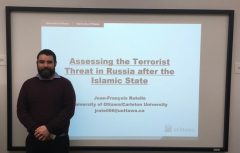Dr. Ratelle discussed his efforts to solve the puzzle as to why thousands of North Caucasus youth left their homes to fight a jihad with the Islamic State (ISIS) in the early 2010s when they were reluctant to do so at home. Interviews with those who became foreign fighters, and their families, led him to the conclusion that these overwhelmingly young men believed that their home society was not worth saving. Ubiquitous alcohol use and what they considered a substantial sex trade placed it outside the realm of transformation to a caliphate. Involvement in religious militancy at home might also cross lines of clan and other local identities.
In Syria they could fight a “five-star jihad,” with advanced weaponry, money, and—ironically—wives provided to them by the Islamic State. The Russian government played an important role also, giving plane tickets, passports, visas and money to potential radicals, exporting their own terrorist threats and then trying to wipe them out in Syria. Now, however, close to 2000 foreign fighters are in limbo, many in Ukraine or Georgia on fake passports as they consider their next steps. Radicalized by the humiliation they felt through police surveillance in Russia and ready to continue to fight for their vision of a pure Islamic state, these fighters pose a significant security threat. Dr. Ratelle warned that you may see many of them ending up in smaller towns and cities across Russia—even in Siberia and the Far East— where surveillance is lighter and they may have relatives involved in trading networks.
